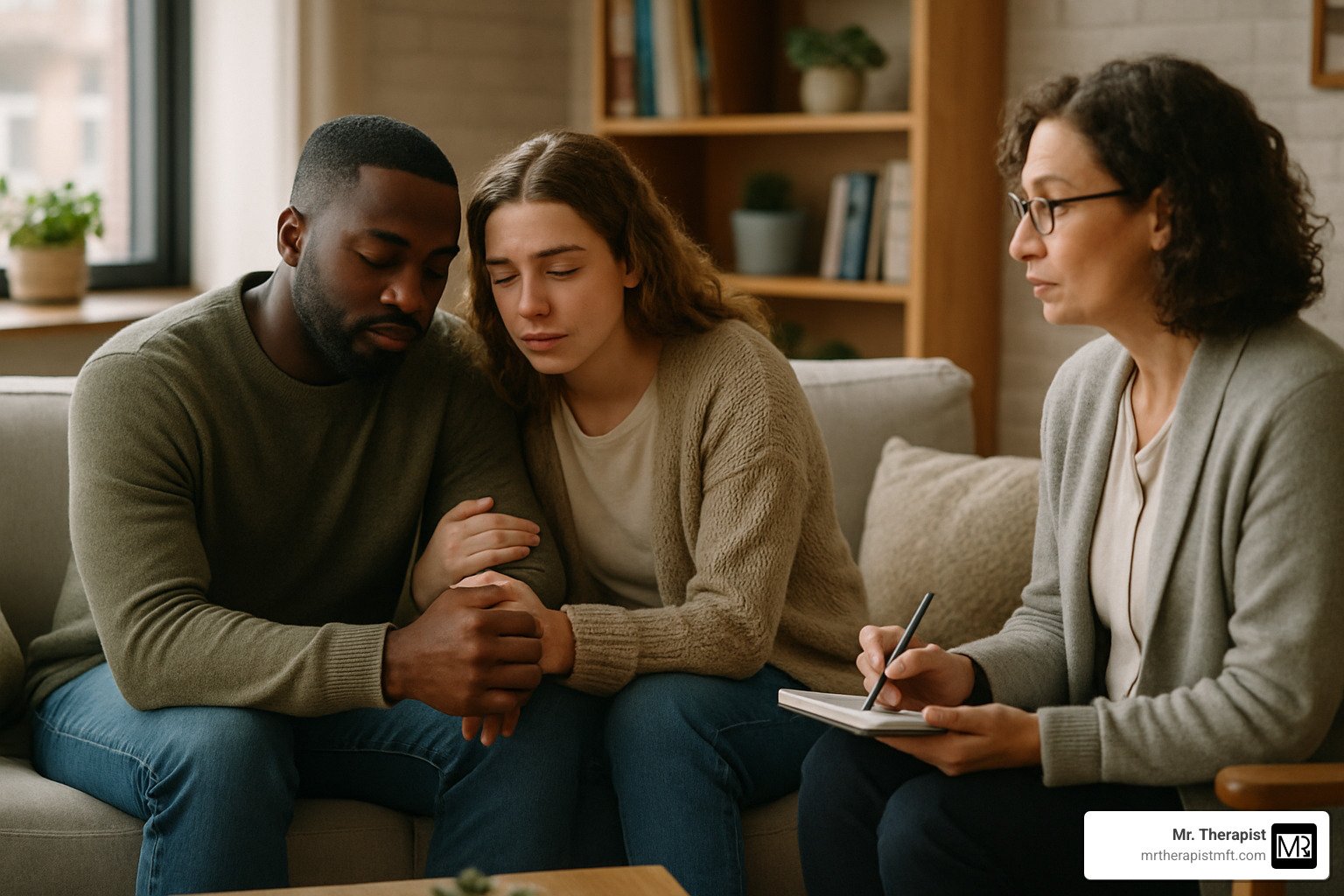
Anxiety therapy for teens is a vital step toward mental health and emotional resilience. In today’s high-pressure world, young individuals often grapple with anxiety stemming from academic stress, social media influences, and peer pressure. Through timely and effective therapy, teens can build the skills they need to tackle anxiety and flourish in life.
- Prevalence: Nearly 32% of teens experience anxiety, making it a common concern.
- Triggers: Factors include peer pressure, hormonal changes, and external expectations.
- Impact: Anxiety can lead to more severe issues like depression if not addressed.
- Solutions: Therapy options such as Cognitive Behavioral Therapy (CBT) and other approaches empower teens to manage their stress.
Teen anxiety differs significantly from that of adults and younger children. Adolescence is filled with unique challenges, such as fearing judgment, struggling with self-image, and balancing various responsibilities. Addressing these issues not only aids in immediate relief but also lays the groundwork for a lifetime of emotional health.
Understanding and addressing teen anxiety is critical. With therapy and support, teenagers can learn to transform worry into well-being, fostering a healthier journey into adulthood.

Recognizing Anxiety in Teens
Spotting anxiety in teens can be tricky. They often mask their feelings, making it hard for parents and caregivers to recognize the signs. However, understanding these signs is crucial for getting them the right help.
Signs and Symptoms
Teens with anxiety might seem more irritable or distant than usual. They might avoid activities they once enjoyed or become overly worried about everyday situations.
Some common signs include:
- Persistent Worry: Teens may constantly worry about school, their future, or social situations.
- Difficulty Concentrating: Anxiety can make it hard for them to focus, affecting their academic performance.
- Avoidance: Skipping social events or school activities is a red flag.
Physical Symptoms
Anxiety doesn’t just affect the mind; it impacts the body too. Teens might complain of headaches, stomachaches, or even fatigue. These symptoms often appear without a clear physical cause.

Behavioral Changes
Teens might also display behavioral changes. They could become more withdrawn, spend excessive time alone, or show a lack of interest in hobbies. Some might even turn to unhealthy coping mechanisms, like experimenting with substances.
Recognizing these signs early is essential. If you notice any of these symptoms, consider seeking professional help. Early intervention can prevent anxiety from developing into more severe conditions, such as depression.
By understanding these early signs, you can better support your teen in navigating their mental health journey.
Types of Anxiety Therapy for Teens
When it comes to anxiety therapy for teens, there are several effective approaches. Each therapy type offers unique strategies to help teens manage their anxiety and improve their mental health. Let’s explore some of the most common therapies used today.
Cognitive Behavioral Therapy (CBT)
CBT is a popular method for treating anxiety. It helps teens identify and change negative thought patterns. By understanding the link between thoughts, emotions, and behaviors, teens can learn to challenge and reframe unhelpful thoughts. This shift in thinking leads to healthier behaviors and reduced anxiety.
CBT is effective because it teaches practical skills that teens can use in everyday situations. It’s often considered the gold standard for anxiety treatment.
Exposure Response Prevention (ERP)
ERP is a specialized form of CBT. It focuses on helping teens face their fears in a controlled way. Many teens with anxiety avoid situations that trigger their fears. However, avoidance can make anxiety worse over time.
With ERP, teens gradually confront their fears in a safe environment. This exposure helps them learn that their fears are manageable and not as threatening as they seem. Over time, this reduces anxiety and builds confidence.
Dialectical Behavioral Therapy (DBT)
DBT is another effective therapy for teens with anxiety. It combines cognitive-behavioral techniques with mindfulness practices. DBT helps teens regulate their emotions and improve interpersonal relationships.
Teens learn to “ride the wave” of their emotions without reacting impulsively. This helps them manage anxiety and stress more effectively. DBT is particularly useful for teens who struggle with intense emotions or have difficulty managing stress.
Acceptance and Commitment Therapy (ACT)
ACT focuses on helping teens accept their thoughts and feelings rather than trying to change them. This therapy teaches mindfulness skills and encourages teens to act in ways that align with their values.
By changing their relationship with their thoughts, teens learn to live with anxiety without letting it control their lives. ACT helps teens focus on what truly matters to them, promoting a sense of purpose and well-being.

Each of these therapies offers valuable tools for managing anxiety. The right approach depends on the individual needs of the teen. Working with a qualified therapist can help determine the best fit for each teen’s unique situation.
Benefits of Anxiety Therapy for Teens
Anxiety therapy for teens offers many benefits that can make a big difference in their lives. Let’s break down how these therapies help teens cope better, regulate their emotions, and improve their overall well-being.
Coping Strategies
Therapy provides teens with effective coping strategies to handle anxiety. They learn practical skills to manage stress and reduce worry. For example, cognitive-behavioral therapy (CBT) teaches teens to challenge negative thoughts and replace them with more positive ones. These strategies empower teens to face everyday challenges with confidence.
Here’s a simple list of coping skills often taught in therapy:
- Deep breathing exercises like the 4-7-8 technique
- Mindfulness practices to stay grounded in the present
- Problem-solving skills to tackle stressful situations
Emotional Regulation
Therapy helps teens understand and manage their emotions better. Techniques from dialectical behavioral therapy (DBT) teach teens how to “ride the wave” of their emotions without acting impulsively. This means they can experience intense feelings without letting them take over.
A key part of emotional regulation is learning to recognize emotions as they arise and choosing how to respond. This leads to healthier relationships and less conflict at home and school.
Improved Well-being
The ultimate goal of anxiety therapy is to improve a teen’s overall well-being. By learning to manage anxiety, teens often experience:
- Better sleep patterns
- Increased self-esteem and confidence
- Stronger relationships with family and friends
These improvements contribute to a more balanced and fulfilling life. As teens gain control over their anxiety, they can focus more on their interests and goals, leading to a brighter future.
In summary, anxiety therapy equips teens with the tools they need to thrive. By developing coping strategies, regulating emotions, and enhancing well-being, therapy sets the stage for a healthier, happier life.
Next, we’ll explore what teens and parents can expect from therapy sessions and how to get the most out of the therapy journey.
Anxiety Therapy for Teens: What to Expect
When it comes to anxiety therapy for teens, understanding what to expect can ease concerns for both teens and their parents. Let’s explore the key elements of therapy sessions, the role of psychoeducation, and how parents can get involved.
Therapy Sessions
Therapy sessions are the heart of the treatment process. They typically involve one-on-one meetings with a trained therapist who guides the teen through various therapeutic exercises. Sessions often start with building trust and understanding the teen’s unique challenges.
Here’s what usually happens in a session:
- Setting Goals: The therapist and teen work together to set achievable goals for the therapy journey.
- Skill Building: Teens learn specific skills to manage anxiety, such as relaxation techniques or cognitive restructuring.
- Progress Review: Regular check-ins help track progress and adjust strategies as needed.
Therapists use different approaches like CBT, ERP, DBT, and ACT, as mentioned earlier. Each method is custom to the teen’s needs, ensuring a personalized experience.
Psychoeducation
Psychoeducation is a crucial part of therapy. It involves teaching teens about anxiety—what it is, how it affects them, and why certain thoughts and behaviors occur. Understanding these concepts helps teens feel more in control.
Benefits of Psychoeducation:
- Empowerment: Knowledge reduces fear and empowers teens to take charge of their mental health.
- Self-awareness: Teens learn to identify anxiety triggers and patterns.
- Informed Decision-Making: With a better understanding, teens can make informed choices about their coping strategies.
Parental Involvement
Parents play a vital role in supporting their teen’s therapy journey. Involving parents can improve the effectiveness of therapy and create a supportive environment at home.
Ways Parents Can Get Involved:
- Attend Sessions: Some therapists invite parents to join sessions occasionally to discuss progress and strategies.
- Create a Supportive Home: Encourage open communication and provide a safe space for teens to express their feelings.
- Learn Together: Parents can educate themselves about anxiety and its treatments to better support their teen.
Programs like the SPACE (Supportive Parenting for Anxious Childhood Emotions) offer guidance on modifying parental behaviors to reduce anxiety in teens. By learning how to respond effectively to their teen’s anxiety, parents can be a powerful ally in the therapy process.
In summary, anxiety therapy for teens involves structured sessions, informative psychoeducation, and active parental involvement. These elements work together to create a comprehensive support system for teens navigating anxiety.
Next, let’s address some frequently asked questions about anxiety therapy for teens, including practical tips and insights for parents and teens alike.
Frequently Asked Questions about Anxiety Therapy for Teens
What is the 3-3-3 rule for anxiety?
The 3-3-3 rule is a simple technique to help calm anxiety in the moment. It’s a quick way to ground yourself when anxiety feels overwhelming. Here’s how it works:
-
Name 3 things you see: Look around and identify three objects. This helps redirect your focus from anxious thoughts to your surroundings.
-
Identify 3 sounds you hear: Listen carefully and pick out three distinct sounds. This can be anything from the ticking of a clock to the sound of birds chirping.
-
Move 3 parts of your body: Wiggle your fingers, rotate your ankles, or shrug your shoulders. Physical movement helps break the cycle of anxious thoughts.
This exercise encourages mindfulness and can be especially useful for teens during high-stress situations.
Which antidepressants can children take?
When it comes to medication for anxiety, some teens may benefit from antidepressants, particularly Selective Serotonin Reuptake Inhibitors (SSRIs). These medications can help regulate mood and reduce anxiety symptoms. However, they are not suitable for everyone and should only be used under the guidance of a healthcare professional.
Common SSRIs prescribed for teens include:
- Fluoxetine (Prozac)
- Sertraline (Zoloft)
Age guidelines and specific dosages should always be discussed with a doctor to ensure safety and effectiveness. It’s important for parents to monitor their teen’s response to medication and communicate regularly with their healthcare provider.
How can parents support their teen’s therapy journey?
Parents are crucial allies in their teen’s therapy journey. Here are some ways they can offer support:
-
Parent Coaching: Consider participating in parent coaching sessions. These sessions teach parents how to effectively support their teen’s mental health and improve communication.
-
Create a Supportive Environment: Encourage open discussions about feelings and experiences. A home that feels safe and accepting can greatly improve therapy outcomes.
-
Practice Relaxation Techniques Together: Engage in activities like deep breathing exercises or meditation with your teen. Techniques such as the 4-7-8 breathing exercise (breathe in for 4 seconds, hold for 7 seconds, exhale for 8 seconds) can be calming for both teens and parents.
-
Educate Yourself: Learn about anxiety and its treatments. This knowledge empowers you to better support your teen and understand their challenges.
By actively participating in their teen’s therapy journey, parents can help create a nurturing atmosphere that promotes healing and growth.
Next, we’ll wrap up our discussion by exploring the unique approach Mr. Therapist takes in supporting teens with anxiety through their comprehensive therapy services.
Conclusion
At Mr. Therapist, we believe that every teen deserves the chance to overcome anxiety and experience emotional healing. Founded by Manny Romero, our practice is dedicated to helping teens and their families steer the challenges of anxiety through compassionate and effective therapy services.
Manny Romero has built a practice that emphasizes Emotion-Focused Therapy (EFT). This approach empowers teens to understand and harness their emotions as tools for healing. By focusing on building emotional resilience, we help teens transform their worries into strengths.
Our therapy services are designed to be inclusive and supportive. We offer both individual and family therapy options to ensure that each teen receives personalized care custom to their unique needs. Our therapists work closely with families to create a nurturing environment where teens feel safe to express themselves and grow.
Why Choose Mr. Therapist?
-
Comprehensive Therapy Services: From individual sessions to family support, we provide a wide range of therapy options to meet the diverse needs of our clients.
-
Expert Guidance: With years of experience, Manny Romero and his team are committed to guiding teens through their anxiety journey with empathy and expertise.
-
Focus on Emotional Healing: We prioritize emotional well-being, helping teens develop the skills they need to steer life’s challenges with confidence.
If you’re ready to explore how Mr. Therapist can support your teen’s journey from worry to well-being, we invite you to learn more about our services here.
Together, we can help your teen build a brighter, anxiety-free future.



